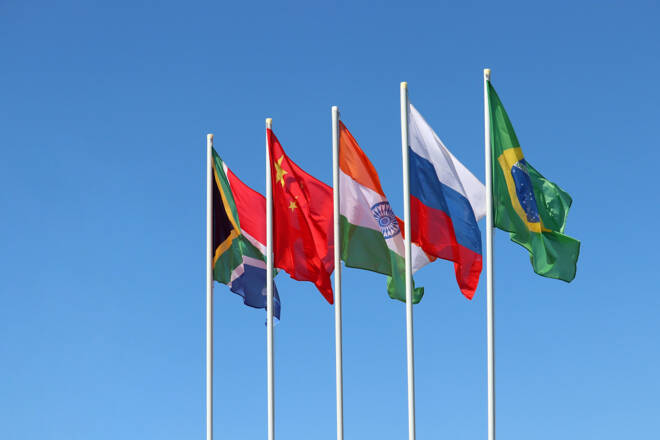Advertisement
Advertisement
Did The BRICS Just Unleash An Inflationary Storm That No-One Saw Coming?
By:
The most eagerly awaited emerging-market powers summit of this year, if not this decade took place this week.
BRICS’ Membership Expansion: Propelling Global Commodities Control from 50% to 80% in the Dawn of a New World Order
With the BRICS expanding its membership to officially declare the beginning of a “New World Order”.
The biggest surprise from the BRICS summit is that Saudi Arabia – the world’s largest Crude Oil producer and Iran, which holds the world’s second-largest Natural Gas reserves – have been invited to join the BRICS group of nations in its first expansion in over a decade.
The BRICS bloc also agreed to admit the United Arab Emirates, Argentina, Egypt and Ethiopia to its ranks – added further fuel to the fire of “a New World Order”. And let’s not forget a fresh impetus to the “de-dollarization” movement, which challenges the dominance of the U.S dollar as the world’s reserve currency.
The inclusion of these new countries, especially Saudi Arabia, the UAE and Iran doesn’t just increase the size of BRICS, but also their overall supremacy in the global Commodities market. As it stands, the current five BRICS members – Brazil, Russia, India, China and South Africa account for approximately 52% of global Commodities supply across the metals, energies and agriculture. The new composition, including Saudi Arabia, the UAE and Iran would almost double the BRICS market share – giving them control of nearly 80% of global Commodities output.
BRICS’ Expansion Fuels De-Dollarization Shift in Global Commodities Trade
With most of the world’s Commodity trade taking place in dollars, the expansion could also enhance the BRICS “de-dollarization” movement and drive more trade through alternative currencies.
For instance, Russia is now using the Chinese Yuan in place of the U.S dollar for international payments and the Yuan is now the most-traded currency in Russia. Elsewhere, Brazil and China are ditching the U.S dollar in favour of their own currencies.
While, the UAE has signed bilateral agreements with India that will see the two countries trade Crude Oil and other major Commodities in their local currencies – not the U.S dollar. Fellow Crude Oil and Natural Gas superpowers Saudi Arabia and Iran have also called for trade to be carried out in other currencies besides the U.S dollar.
All this is clearly chipping away at the dominance of the U.S dollar and the magnitude of this situation should not be underestimated.
According to BRICS officials, more than 40 countries have formally applied to join the group – hinted that the expansion is only just getting started!
As the BRICS group of nations continue to rapidly expand, so will the trend among their members of ditching the U.S. dollar in favour of doing business in alternative currencies.
Dollar Dump Fears Rise Amid Surging Interest in Commodities Trade
When that happens, all of the countries that have had to hold dollars for the last 50 years, will no longer have a reason in holding them. But here’s the interesting part – if all these countries start to dump dollars – that will send a tsunami of inflation hitting the shores of the West.
During the first half of this year, Google searches for the phrase “How To Trade Commodities” surged to the highest level on record ever.
Once again, that trend is on the rise with Google searches for the exact phrase snatching headlines as the second-most searched term this month!
Commodity Price Forecast
Where are prices heading next? Watch The Commodity Report now, for my latest price forecasts and predictions:
About the Author
Phil Carrcontributor
Phil Carr is co-founder and the Head of Trading at The Gold & Silver Club, an international Commodities Trading, Research and Data-Intelligence firm.
Advertisement
